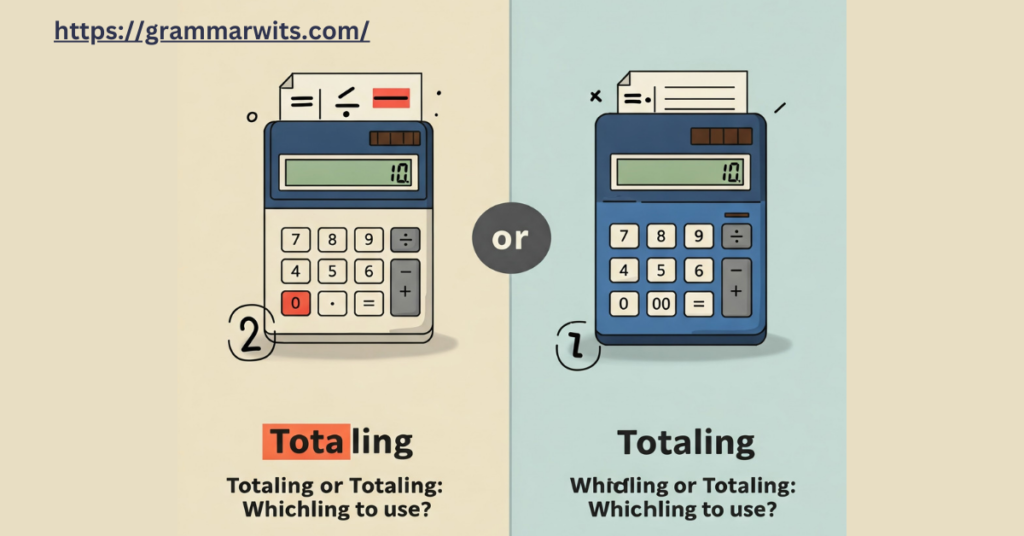Totaling (or totalling) refers to the present participle form of the verb “total,” meaning to add up, calculate the sum of, or amount to a specified number or quantity. This seemingly simple word presents writers with a choice between single or double ‘l’ spelling, a distinction that reflects the broader patterns of American versus British English orthography. Totalling or Totaling: Which Spelling to Use?” depends on whether you follow British or American English rules.
Have you ever hesitated before typing this word, finger hovering uncertainly over your keyboard? You’re not alone. This tiny spelling difference might seem trivial, but choosing incorrectly can immediately signal to readers that you’re not familiar with their regional conventions—potentially undermining your credibility in professional communications, financial documents, or published works.
The totaling/totalling divide represents one of the most common yet overlooked spelling variations in English. While both forms are technically correct, using the appropriate version for your audience demonstrates attention to detail and cultural awareness. American publications and businesses standardize on “totaling,” while British English and most Commonwealth nations prefer “totalling”—a small distinction with significant implications for how your writing is perceived across different English-speaking regions
Origins and Etymology
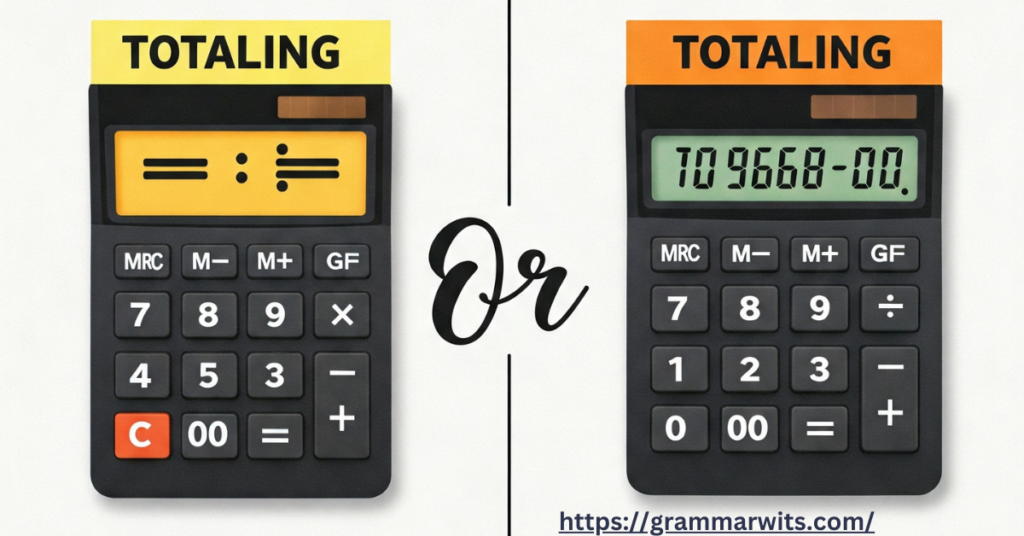
The word “total” comes from Medieval Latin totalis, meaning “entire” or “complete.” When we add the suffix “-ing” to create the present participle, we encounter our first regional split in English language evolution.
The verb “total” follows specific patterns when conjugated:
- Present: I total, you total, he/she/it totals
- Past: totaled/totalled
- Present participle: totaling/totalling
But why the spelling divergence? The answer lies in the historical development of language standardization across English-speaking regions.
American vs. British English Spelling Rules
The difference between “totaling” and “totalling” stems from broader spelling conventions that separate American and British English.
British English Consonant Doubling
In British spelling, when a word ends with a vowel plus a consonant, you typically double the final consonant before adding suffixes that begin with vowels (-ing, -ed, -er).
Examples of British spelling:
- travel → travelling
- model → modelling
- cancel → cancelling
American English Approach
American spelling generally follows a simplified approach, avoiding the double consonant except when the stress falls on the final syllable.
Examples of American spelling:
- travel → traveling
- model → modeling
- cancel → canceling
However, when the stress falls on the final syllable, both varieties double the consonant:
- begin → beginning
- commit → committing
“The differences between British and American spelling came about due to deliberate efforts in the 19th century—primarily by Noah Webster—to distinguish American English and simplify spelling.” — Oxford English Dictionary
When to Use “Totaling”
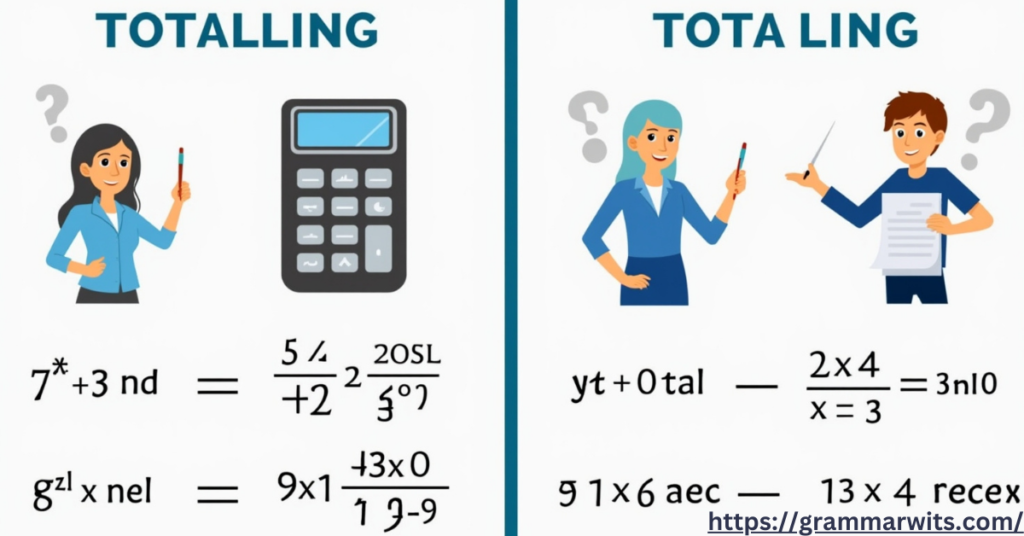
“Totaling” (with one ‘l’) is the correct form in American English. If you’re writing for an American audience or publishing in American publications, this is your go-to spelling.
The Associated Press Stylebook, The Chicago Manual of Style, and Merriam-Webster—the major American style and reference guides—all endorse the single ‘l’ spelling.
American Usage Examples:
- The damages are totaling over $2 million.
- After totaling the expenses, we came in under budget.
- The company’s losses are totaling more than expected.
Industries Where “Totaling” Predominates
| Industry | Common Usage Context |
|---|---|
| American Finance | Financial reports, accounting documents |
| US Publishing | Books, newspapers, magazines, academic journals |
| American Tech | Software interfaces, documentation, coding comments |
| US Legal System | Court documents, legal briefs, contracts |
When to Use “Totalling”
“Totalling” (with double ‘l’) is standard in British English and countries that follow British conventions, including:
- United Kingdom
- Australia
- New Zealand
- Canada (though Canadian English sometimes adopts American spellings)
- Most Commonwealth nations
British Usage Examples:
- The damages are totalling over £2 million.
- After totalling the expenses, we came in under budget.
- The company’s losses are totalling more than expected.
Major British style guides like the Oxford Style Manual and dictionaries such as the Oxford English Dictionary recommend the double ‘l’ spelling for British audiences.
Case Study: BBC Style Guide
The BBC, one of the most respected British media organizations, explicitly requires “totalling” in its style guide, consistent with other -ll endings in British verb conjugation. This linguistic norm extends to many Commonwealth countries that follow similar conventions.
Digital Age Considerations
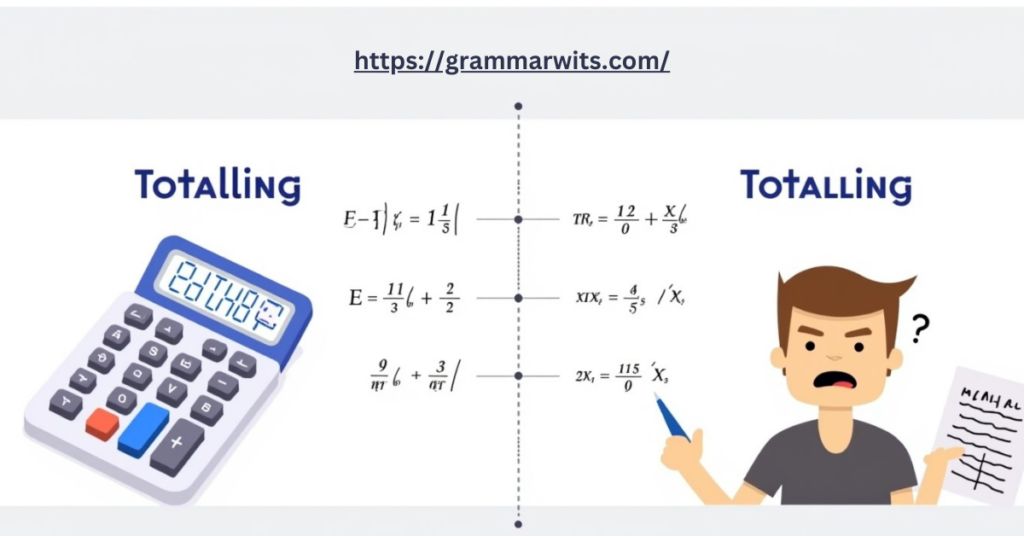
In our increasingly connected world, regional preference in spelling has new implications.
SEO Implications
From an SEO perspective, using the regionally appropriate spelling matters. Search engines have become sophisticated enough to understand regional variations, but users still tend to search using their familiar spelling.
Tips for Global Content Strategy:
- For region-specific sites (.co.uk vs .com), use the corresponding spelling
- For global sites, consider using the spelling most common among your target audience
- Maintain consistency throughout a single document or website
Spell Checkers and Digital Tools
Many word processors and writing tools allow you to set your preferred English language conventions:
- Microsoft Word: Choose between English (US) and English (UK)
- Google Docs: Set language preferences in the Tools menu
- Grammarly: Configure your preferred dialect
Common Expressions and Phrases
The word “total” appears in various expressions where the -ing form might be used:
- Totaling/Totalling up: The process of adding up or summing figures
- Totaling/Totalling system: A system for calculating or tabulating values
- Computer totaling/totalling: Automated computing of values
In accounting and finance, you’ll encounter specialized terminology:
- Column totaling/totalling: The process of aggregating figures in a column
- Cross-totaling/totalling: Tallying figures both horizontally and vertically
- Balance totaling/totalling: Ensuring debits and credits match
Usage in Sentences
Let’s compare some examples to see both spellings in action:
American Examples (Totaling)
- “The storm caused damages totaling $3.5 million across three counties.”
- “She spent the afternoon totaling the receipts from last month’s fundraiser.”
- “The new arena has begun construction, with costs totaling approximately $250 million.”
British Examples (Totalling)
- “The storm caused damages totalling £3.5 million across three counties.”
- “She spent the afternoon totalling the receipts from last month’s fundraiser.”
- “The new arena has begun construction, with costs totalling approximately £250 million.”
Similar Spelling Patterns to Be Aware Of
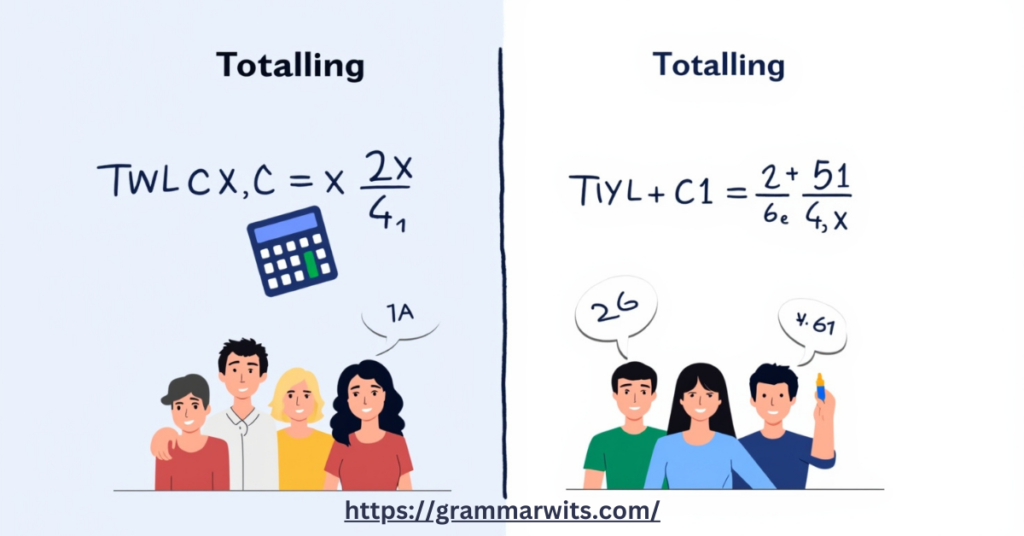
The totaling/totalling distinction is just one example of a broader pattern of spelling differences between American and British English. Understanding these patterns can help you remember which spelling belongs where.
Words Following the Same Pattern
| American Spelling | British Spelling |
|---|---|
| traveling | travelling |
| labeling | labelling |
| fueling | fuelling |
| signaling | signalling |
| modeling | modelling |
| paneling | panelling |
| dueling | duelling |
| quarreling | quarrelling |
In all these cases, the principle is the same: British English doubles the final ‘l’ before adding a suffix beginning with a vowel, while American English typically doesn’t.
Memory Tip
To remember which spelling belongs to which variety of English, think of the British tendency toward linguistic conservatism—they keep more letters (double ‘l’). American English, influenced by Noah Webster’s spelling reform efforts, tends toward simplification (single ‘l’).
Practical Guidelines for Writers
When deciding between “totaling” and “totalling,” consider these practical guidelines:
Audience-Based Choice
- Writing for Americans: Use “totaling”
- Writing for Britons: Use “totalling”
- Global audience: Choose based on your primary readership or house style
Consistency Is Key
Whatever spelling you choose, be consistent throughout your document. Mixing “totaling” and “totalling” in the same piece suggests carelessness or confusion.
Style Guide Alignment
Follow your organization’s style guide. If you’re writing for publication, check whether they follow American or British conventions:
- Academic journals often specify their preferred spelling conventions
- International organizations may have their own guidelines
- Some Canadian publications may accept either form
“Consistency within a text is arguably more important than strict adherence to either American or British conventions. A mixed approach only confuses readers.” — The Chicago Manual of Style
Conclusion
The question of “Totalling or Totaling: Which Spelling to Use” comes down to knowing your audience. Both spellings are correct, but in different regions. Use “totaling” (one ‘l’) when writing for American readers, and “totalling” (two ‘l’s) for British and Commonwealth audiences. This small detail shows you understand language conventions and care about your writing quality. Whatever choice you make, stay consistent throughout your document.
“Totalling or Totaling: Which Spelling to Use” represents just one example of the fascinating regional differences that enrich the English language. By understanding this pattern, you’ll also master similar word pairs like traveling/travelling and modeling/modelling. Remember that neither spelling is wrong – they simply belong to different English traditions. When in doubt, check your style guide or consider who will read your work. This attention to detail marks the difference between good writing and great communication.
- Use “totaling” (one ‘l’) for American audiences
- Use “totalling” (two ‘l’s) for British and Commonwealth audiences
- Be consistent within a single document
- Consider your audience and publication guidelines
By understanding these spelling differences, you can navigate this common writing challenge with confidence and precision, ensuring your writing meets the expectations of your intended readers.
FAQ Section
Is one spelling more correct than the other?
No, neither spelling is more “correct.” “Totaling” is correct in American English, while “totalling” is correct in British English. They represent different regional variations of English rather than one being right and the other wrong.
Can I use both spellings interchangeably?
It’s not recommended. Consistency is important in professional writing. Choose the spelling that matches your audience’s expectations or your publication’s style guide.
How do major style guides address this issue?
American style guides (AP, Chicago) recommend “totaling,” while British style guides (Oxford) recommend “totalling.” Always check your required style guide for specific guidance.
Will using the wrong regional spelling affect comprehension?
No, readers will understand either spelling. However, using the non-standard spelling for your region may distract some readers or make your writing appear less polished.
How do editors typically handle these spelling variations?
Professional editors will typically align spelling with the publication’s house style, which usually follows either American or British conventions consistently throughout.

Alizy Smith is a passionate language enthusiast and the admin of Grammar Wits. With a love for wordplay, grammar quirks, and witty expressions, she’s dedicated to making language learning fun and accessible. From grammar tips to pun-filled laughs, Alizy ensures every piece of content entertains while educating — turning tricky rules into easy, enjoyable reads.
